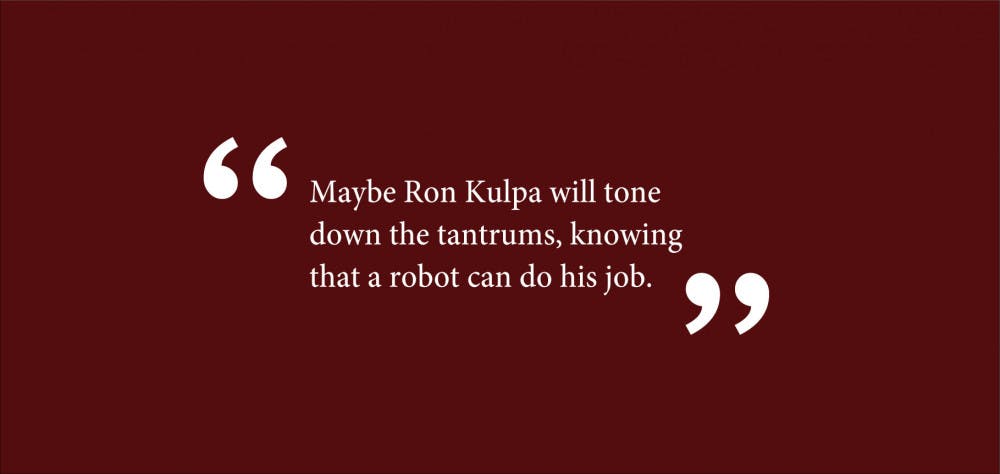As Houston Astros manager A.J. Hinch reluctantly left his dugout to confront the home plate umpire who was practically baiting him to come out, his mind was probably swirling with justified expletives and anger. But behind all of that, what was he thinking? Was he thinking about what has been becoming clearer for years — that baseball umpires need to change?
Was he thinking, in short, that it’s about time baseball instituted robot umps?
I know I was. This has been on baseball fans’ minds for a while, but it was driven home for many last Wednesday when Hinch’s Astros played the Texas Rangers. Home plate umpire Ron Kulpa made a bad call on a Rangers pitch in the first inning, then appeared to attempt to provoke a confrontation with several Astros players when the inning ended.
Then, in the second, with the Astros batting, Kulpa saw a ball in the dirt and called it a strike. The Astros dugout understandably got angry, and Kulpa tore off his mask and started hollering back at them. Hinch came out and calmed the situation down. An average adult might have contained himself and gone back to umpiring. Ron Kulpa didn’t.
Instead he stared down the Astros’ bench.
“Don’t look over here!” Hinch shouted. “There’s nothing to see! Look out there,” he continued, pointing to the field. Again, a professional umpire might have listened and turned toward the field, toward the pitcher he was supposed to umpire.
Instead, Kulpa kept staring at the Astros’ dugout. His mask was off. He was smirking. So Hinch came out to stand up for his team. Remarkably, he was still calm. As TV broadcasters explained that Kulpa had turned away from the pitcher to stare down the Astros, Hinch walked back to his dugout again.
And still, Kulpa’s tantrum wasn’t through. The next pitch was a strike. After he called it, Kulpa stared down the Astros’ dugout again.
“You can’t keep doing it! You can’t keep doing it!” Hinch shouted. And as the Astros’ manager came out again and started to argue, Kulpa, mask off in full bluster, responded:
“I can do whatever I want.” And somewhere during this mess, Kulpa ejected Alex Cintron, the Astros’ hitting coach.
So why do we need robot umps? There are a few reasons.
For one, it doesn’t seem like an impossible task to come up with a robot that won’t scream “I can do whatever I want” at a manager in a game that’s supposed to be a showcase for the players and not the umpires. The role of the umpire is to do as little as possible, to make themselves invisible until they need to make a call. It’s not a glamorous role, and it’s not supposed to be.
Any time a baseball game becomes about an umpire — an umpire blustering, hollering, taunting, gratuitously ejecting or doing whatever else a rogue umpire might do — it stops being about the players. And the game, of course, is supposed to be about the players. Baseball players are some of the most impressive athletes in the world. Half of them can throw a leather covered ball with ridiculous spins at speeds exceeding 100 miles per hour — and the other half can hit those throws 400 feet. And meanwhile, we’re all focused on Ron Kulpa, an angry 50-year-old man whose name we had all forgotten until he stole the spotlight.
But ignore Kulpa for a moment. The real reason we need robot umps isn’t to avoid ump shows — that will be a benefit, but they’re few and far between. Kulpa’s biggest problem wasn’t his game-long tantrum. It was his strike zone.
Remember the pass interference non-call that cost the New Orleans Saints a chance at the Super Bowl? As long as umpires like Kulpa continue calling balls and strikes, it’s inevitable the same thing will happen in baseball. Most baseball calls are reviewable by now, but balls and strikes — like pass interference — are not.
So we could make balls and strikes reviewable, which would be a nightmare. Imagine managers challenging every close pitch, and pausing several times an inning to review. There’s no good way to do it. Either you give managers lots of ball and strike challenges, and see dozens of stoppages every game, or you give them only a few, and make them meaningless. No one will challenge a bad strike call in the third inning because they’ll be worried about the ninth — and bad strike zones will persist.
We can’t start challenging balls and strikes. So we need robot umps. It’s not a radical idea: the technology exists and could be easily implemented. An umpire on the field with an earpiece could listen to a robot umpire and relay the call. It might be a tough adjustment at first, but it will be worth it. We won’t have to worry about a bad ball or strike call ruining a team’s season. And maybe Ron Kulpa will tone down the tantrums, knowing that a robot can do his job.
James Schapiro ’19 can be reached at james_schapiro@brown.edu. Please send responses to this opinion to letters@browndailyherald.com and op-eds to opinions@browndailyherald.com.





